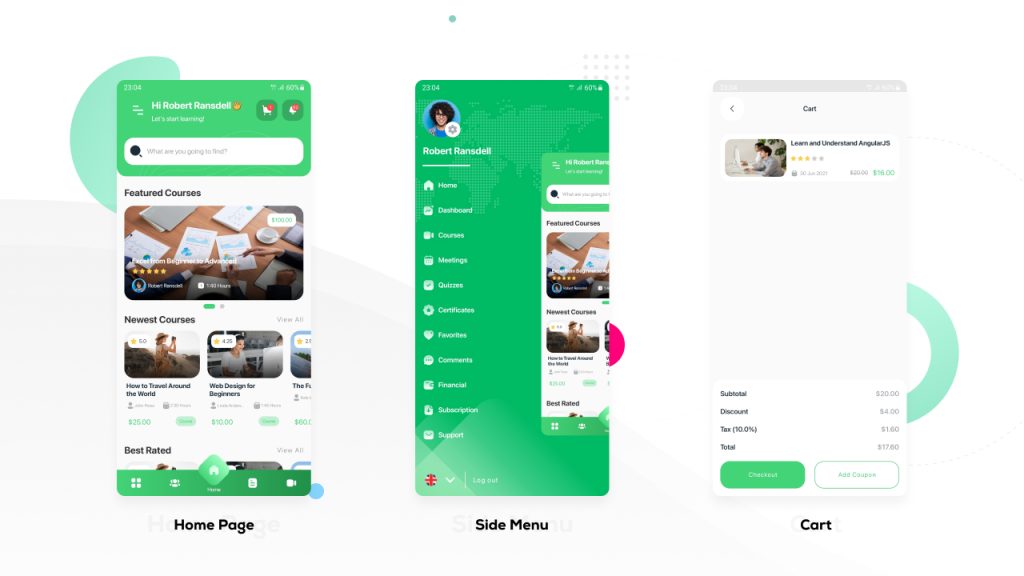Education apps come in various types, catering to different learning styles, age groups, and educational needs. Here are some of the most common types of education apps:
1. E-Learning and Course Apps
- Purpose: Provide structured courses on various subjects, ranging from academic topics to professional skills.
- Examples:
- Udemy: Offers a wide range of online courses in topics like programming, business, and personal development.
- Coursera: Provides courses, certifications, and degree programs from top universities and companies.
- edX: Offers online courses from universities like MIT, Harvard, and other institutions.
2. Language Learning Apps
- Purpose: Help users learn new languages with interactive lessons, quizzes, and practice tools.
- Examples:
- Duolingo: Offers free language learning courses in a gamified format for dozens of languages.
- Babbel: Focuses on teaching languages through real-life conversations and contextual learning.
- Rosetta Stone: Offers immersion-based language learning, focusing on speaking and pronunciation.
3. Homework Help Apps
- Purpose: Assist students with homework by providing explanations, solutions, and tutoring services.
- Examples:
- Photomath: Solves math problems through image recognition and provides step-by-step solutions.
- Chegg: Offers textbook rentals, homework help, tutoring, and study materials.
- Khan Academy: Provides video lessons and exercises for a wide range of subjects, especially mathematics and science.
4. Tutoring and Mentorship Apps
- Purpose: Connect students with tutors or mentors for one-on-one learning and personalized academic support.
- Examples:
- Wyzant: Connects students with qualified tutors for subjects ranging from math to music.
- Preply: A platform for online tutoring in languages, academic subjects, and other skills.
- Skooli: Offers online tutoring for various subjects, including math, science, and language arts.
5. Study and Flashcard Apps
- Purpose: Help students with studying through flashcards, quizzes, and spaced repetition techniques.
- Examples:
- Anki: A flashcard app that uses spaced repetition to help memorize information more effectively.
- Quizlet: Allows students to create flashcards and study sets on any topic, along with pre-made sets for various subjects.
- Cram: Offers tools for creating flashcards and study guides for better retention.
6. Reading and Literature Apps
- Purpose: Help students and readers improve reading skills, find books, and engage with literature.
- Examples:
- Audible: Provides audiobooks for listeners to engage with literature and nonfiction works.
- Epic!: A digital library for children offering books, audiobooks, and educational videos.
- Goodreads: A social platform for book lovers to track reading, discover books, and participate in reading challenges.
7. Math Learning Apps
- Purpose: Focus on teaching and helping students practice math skills, from basic arithmetic to advanced calculus.
- Examples:
- Khan Academy: Provides lessons and exercises for math at all grade levels, from basic to advanced.
- Photomath: Helps with solving and understanding math problems step-by-step.
- Mathway: A problem-solving app that offers solutions to math equations across different topics.
8. Science Learning Apps
- Purpose: Provide interactive tools, lessons, and experiments for students to learn various scientific concepts.
- Examples:
- Labster: A platform that offers virtual science labs for high school and college students.
- Star Walk: An astronomy app that lets users explore the night sky and learn about constellations and planets.
- Toca Lab: A science app designed for kids to explore the world of chemistry with fun experiments.
9. STEM Education Apps (Science, Technology, Engineering, Math)
- Purpose: Promote learning in STEM subjects through interactive content and problem-solving challenges.
- Examples:
- Tynker: Teaches coding through game-like activities for children.
- Scratch: A coding app that helps kids create games and stories by programming.
- Kodable: A coding app for young children to learn programming fundamentals.
10. Test Preparation Apps
- Purpose: Assist students in preparing for standardized tests, exams, and certifications by offering practice questions, quizzes, and study materials.
- Examples:
- Magoosh: Provides test prep resources for GRE, GMAT, SAT, ACT, and other exams.
- Kaplan: Offers test prep courses, practice exams, and study materials for standardized tests.
- SAT Prep by Khan Academy: Official test prep resources for the SAT exam, including practice questions and video lessons.
11. Interactive Learning and Gamified Education Apps
- Purpose: Use games, challenges, and interactive elements to make learning fun and engaging.
- Examples:
- Kahoot!: A game-based learning platform where users can participate in quizzes on various topics.
- Quizizz: Similar to Kahoot!, it allows students to take part in live quizzes and learning activities.
- Prodigy: A math game designed for children that adapts to their learning level as they progress.
12. Virtual Classrooms and Learning Management Systems (LMS)
- Purpose: Provide platforms for teachers and students to interact, submit assignments, and track academic progress.
- Examples:
- Google Classroom: A virtual classroom that helps teachers create, distribute, and grade assignments.
- Moodle: An open-source learning platform used by schools and universities for managing courses and content.
- Schoology: An LMS that enables teachers to create online courses, assignments, and grades for students.
13. Creative Learning Apps (Art, Music, Design)
- Purpose: Foster creativity through art, music, and design-based activities.
- Examples:
- Procreate: A popular digital drawing and illustration app for artists.
- GarageBand: A music creation app that lets users compose, record, and mix music.
- Canva: A graphic design app that helps users create visuals, presentations, and educational materials.
14. Mind Mapping and Note-Taking Apps
- Purpose: Help students organize thoughts, take notes, and visualize information in creative ways.
- Examples:
- Evernote: A note-taking app that allows students to capture, organize, and store notes and documents.
- Notion: An all-in-one workspace for note-taking, project management, and collaboration.
- MindMeister: A mind mapping app that helps students visually organize ideas and information.
15. Career and Skill Development Apps
- Purpose: Focus on helping students and professionals develop career-related skills and prepare for job markets.
- Examples:
- LinkedIn Learning: Offers online courses on a wide range of professional skills, from business to technology.
- Skillshare: Provides creative and business-related courses for professionals looking to develop new skills.
- Duolingo English Test: Helps non-native speakers practice and improve English skills for career advancement.
16. College and University Apps
- Purpose: Help prospective and current students with their college or university journey, including admissions, campus life, and course management.
- Examples:
- College Scorecard: Offers information on colleges and universities, including costs, financial aid, and outcomes.
- CampusLife: A university app that helps students engage with campus events, organizations, and resources.
- U-Assistant: An app that assists college students with organizing their schedules, assignments, and campus resources.
These apps serve diverse educational purposes and cater to different user needs, ranging from early childhood education to professional development, and from basic learning to advanced academic research.
















